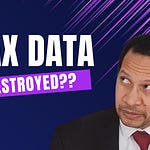Since the beginning of the COVID-19 pandemic, I’ve focused on understanding the science behind this virus and the immune system's response. One of the central ideas I’ve explored is the concept of severe COVID-19 as a viral-mediated autoimmune condition—an idea that guided my approach from early 2020. While not every prediction I made was perfect, many were accurate because I allowed science, not narratives or politics, to guide my thinking.
Today, public trust in health authorities has plummeted. During the pandemic, trust in doctors fell from 71% to 40%, and the erosion of confidence in public health messaging has had profound consequences. To restore trust, we need to confront some difficult truths about what went wrong and how to move forward.
The Problem of Misinformation and Miscommunication
One of the biggest issues during the pandemic was the prevalence of inaccurate public health messages. For example, early in the vaccine rollout, claims were made about COVID-19 vaccines providing 100% protection against severe disease and death. These statements weren’t just overly optimistic—they were fundamentally flawed. When the vaccines were developed, their efficacy was based on relative risk reduction, not absolute risk reduction, leading to exaggerated perceptions of their protective power.
The public isn’t naïve. When they saw vaccinated individuals still contracting and, in some cases, dying from COVID-19, the disconnect between messaging and reality became obvious. Basic questions arose: If vaccines are so effective, why are breakthrough cases so common? Why are vaccinated individuals still being asked to mask up? These were legitimate concerns, but public health officials often dismissed them instead of addressing them transparently.
This lack of engagement has created a dangerous ripple effect. People began to question not just COVID-19 vaccines but other vaccination programs and public health directives. The damage to trust extends beyond this pandemic—it threatens the credibility of public health efforts for years to come.
The Science Was Flawed from the Start
Another major issue is that the scientific foundation for many public health policies was either incomplete or misunderstood. For instance, why did countries like Papua New Guinea, with some of the lowest vaccine uptakes globally, not experience the catastrophic outcomes predicted by many models? Public health authorities attributed this to demographic factors like a younger population, but that explanation doesn’t hold when you consider regions with high rates of co-morbidities, such as HIV in Mozambique, also avoided disaster.
This suggests that the underlying science driving many public health decisions was flawed or oversimplified. Models predicted that without vaccines, mortality rates would skyrocket, but these models often didn’t align with real-world data. This disconnect further eroded trust in public health institutions.
What Needs to Change
To rebuild trust, public health must take several key steps:
Acknowledge Mistakes: The first step to regaining credibility is to admit where things went wrong. Public health officials need to confront the fact that many early assumptions and strategies were flawed and openly address why those mistakes happened.
Return to the Basics of Science: Before crafting public health messages, it’s crucial to revisit the science. What were the mechanisms driving severe COVID-19? Why were some populations less affected than predicted? What role did vaccines truly play in reducing mortality and transmission? Without clear, evidence-based answers, any attempts at communication will fail.
Engage with the Public’s Questions: People want answers to their concerns, not dismissals. Why did vaccinated individuals still need masks? Why didn’t vaccines stop transmission as promised? Honest, transparent communication is the only way to address these questions and rebuild trust.
Separate Science from Politics: One of the most damaging aspects of the pandemic response was the politicization of public health. Science should guide decisions, not political agendas. When politics and health messaging mix, the public often feels manipulated, further eroding trust.
Looking Ahead
The pandemic has exposed deep flaws in the way we communicate public health information. If these issues aren’t addressed, the consequences will extend far beyond COVID-19. Public health officials must go back to the drawing board, focus on the science, and engage with the public in a way that prioritizes transparency and accountability.
This isn’t just about COVID-19—it’s about the future of public health. If we want people to trust us again, we need to earn that trust by being honest about what went wrong and showing that we’ve learned from our mistakes.
Please support my research efforts by subscribing to Vejon Health Substack. Your support allows me to continue bringing you my insights in a timely and effective way.













Share this post